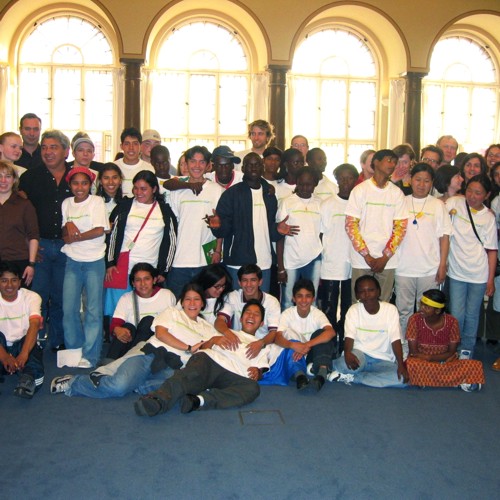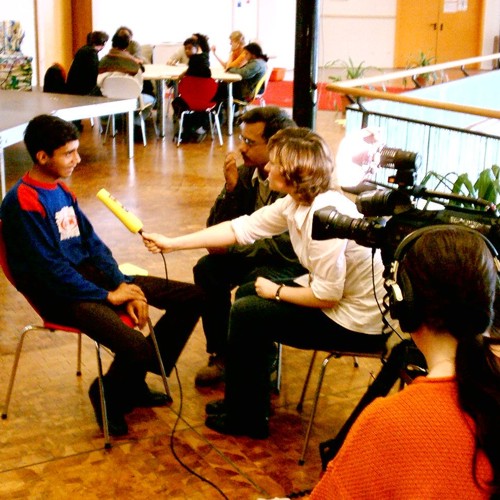Berlin 2004
The Second World Meeting in Berlin (Germany), 2004
In 2004, delegates of the movements of working children and youth from Latin America, Africa and Asia met for the Second World Meeting in Berlin. Events were held throughout Germany and a worldwide organisation of working children and youth was established.
The Second World Meeting
The Second World Meeting of the movements of working children and youth in Africa, Asia and Latin America, which took place from 19 April to 1 May 2004, was held in Berlin. A total of 30 delegates from the following countries took part: Afghanistan, Angola, Bangladesh, Benin, Bolivia, Burkina Faso, Chile, Guatemala, Guinea (Conakry), Guinea-Bissau, India, Colombia, Mexico, Mongolia, Nepal, Niger, Paraguay, Peru, Rwanda, Senegal, Zimbabwe and Venezuela. Also present as guests were three youths from Russia, who did not have delegate status. Young people from Berlin accompanied the world meeting with a newspaper published in four languages. The motto of the world meeting was: "Yes to work - no to exploitation. We are not the problem, but part of the solution".
Before, during and after the second world meeting in the FEZ Wuhlheide, numerous meetings and events took place in Berlin and other German cities from 18 April to 15 May 2004. They served to provide information on the situation of working children and their organisations in the countries of the Global South, to exchange experiences and ideas, to provide development education and to prepare activities to support and improve the situation of working children.
Meetings and events in Berlin and other cities
During their time in Berlin, the delegates visited several Berlin schools, met with children and young people, representatives of the Federal Government, the Berlin Senate, trade unions, non-governmental organisations from the fields of children's rights and development cooperation, organisations critical of globalisation and fair trade organisations. In cooperation with the Grips-Theater, a theatre workshop was held together with Berlin pupils. A working group from the Berlin University of the Arts accompanied the meeting with creative workshops on the topic of work (Workers Library), in which numerous Berlin children took part; in this context, the delegates also presented handicraft products from their countries, which had been produced by children under their own direction. A press conference was also held and several meetings with journalists took place.
Following the conference in Berlin, the delegates travelled to several German cities to meet children and youth, representatives of local authorities, local initiatives and organisations and representatives of the press and to draw attention to their situation. These events had been prepared by local initiative groups.
The meetings and events left a lasting impression on all those involved. In some cases, concrete arrangements for further cooperation were made. The response in the media was also considerable.
Conference contents
With Germany as the venue, the movements hoped to attract the widest possible public attention to their aims and interests. They were particularly interested in being able to influence European public opinion on child labour and the situation and rights of working children in the South.
In terms of content, the conference was organised in such a way that the children and youth were able to analyse their economic, social and political situation, jointly draw up an action plan and give themselves an organisational structure as a world movement of working children and youth (up to 18 years of age). On 1 May they took part in the trade union demonstration in Berlin with their own banners. Following the conference, the delegates travelled to Dessau, Dresden, Düsseldorf, Erfurt, Freiburg, Leipzig, Munich, Osnabrück/Hanover and Rostock, among other places, to draw attention to their situation and promote their aims and demands.
During the World Meeting, delegates concluded that the situation of children in their countries has continued to deteriorate and that they are often treated as "social rubbish". The globalisation forced by the rich countries as well as by the multinationals and institutions such as IMF (International Monetary Fund), WTO (World Trade Organisation) and World Bank has almost only brought disadvantages for them and confronted them with more violence and new forms of exploitation. The measures imposed on their countries by the International Labour Organisation(ILO) to ban and abolish child labour have not helped working children; on the contrary, they have pushed them further into lawlessness. Many have been forced to move into jobs where they are treated and paid even worse and are at the mercy of arbitrariness.
ILO Convention 138 and 182
The children and youth gathered at the World Meeting rejected the ILO Convention No. 138 on the minimum age of employment of children and insisted on being able to decide for themselves when, where and how they work. Through their organisations, they have been fighting against all forms of exploitation for years: for example, they do not want to be told which jobs to do and which to leave. They insist on being allowed to earn their living on the streets and other public places and refuse to have their work declared across the board as one of the "worst forms of child labour" and to be harassed and driven away by the police or private security services. The organisations of working children and youth combat all forms of child trafficking, child prostitution and the instrumentalisation of children for war, drug trafficking or pornography; however, they do not see this as forms of child labour - as suggested by ILO Convention No. 182 - but as crimes against children.
Instead of putting money into programmes to abolish child labour, the governments of the rich countries of the North are being called upon to finally do something about the exploitation and indebtedness of the poor countries of the South and the unfair distribution of wealth around the globe. Instead of taking work away from children and directing them to schools that are useless for their lives and in which they are disadvantaged and discriminated against as working children, the delegates of the World Meeting called on the states of the world to provide them with free education and training that is close to life and improves their chances in the future. As working children, they call for educational institutions and programmes that emphasise the educational value of work, take their situation into account, their experiences seriously and address these.
Expectations of the movements from possible cooperation partners
Delegates expected trade unions and NGOs to recognise their organisations as equal partners and to support them unreservedly. In particular, they demanded support in their fight for dignified work and in the implementation of their own work projects and cooperatives, which they themselves determine. These serve not only to provide a dignified livelihood and self-financing for their organisations, but also represent a form of solidarity-based economy that contains the seeds for a better world. They expect fair trade organisations to no longer condemn and boycott the work of children across the board, but to help them make the products of their work projects known and sold internationally. During the entire time of the World Meeting, an exhibition of these products was held in a Worker's Library.
A worldwide organisation and networking
Organisations of working children and youth exist today in more countries than ever before, in still further countries they are emerging. In many countries they have earned the respect of governments, NGOs and in some cases trade unions. Some of the rights they have formulated have been better translated into reality, while for others much remains to be done. The international networking of their organisations that has been achieved so far has proved to be beneficial and has helped to raise the profile of the voice of working children.
A worldwide organisation of working children and youth was established at the Berlin World Meeting. It is democratically structured and enables the working children of all continents - taking into account their cultural and social differences - to participate on equal terms. The World Movement of Working Children and Youth will work with greater strength to be represented in a representative manner in all international organisations and to achieve that nothing concerning working children is decided against their common and organised will. The working children and youth of Africa, Asia and Latin America have become a social force which can contribute to making a better world possible for all children.
Organisation of the meeting
The organisation of the events was in the hands of ProNATs, at that time still an initiative group against exploitation and for the empowerment of working children, the partner organisation ItaliaNats, and the Freizeit- und Erholungszentrum Berlin (FEZ). The World Meeting and the events organised in connection with it were organised by Oikos Eine Welt e.V. several NGOs, foundations, the trade unions Ver.di and GEW, the InWEnt gGmbH (BMZ), the Berlin Senate's Landesstelle für Entwicklungszusammenarbeit and the Evangelischer Entwicklungsdienst.
Related pages
Complete documentation of the Berlin meeting (in German)
Updated: 14.12.2020

